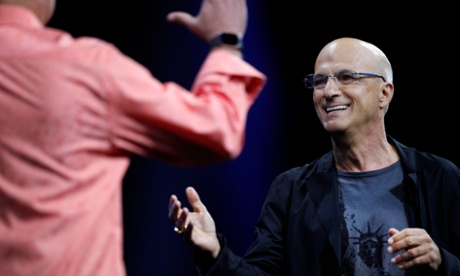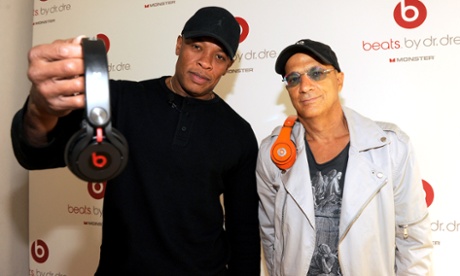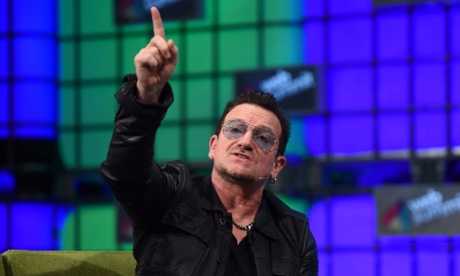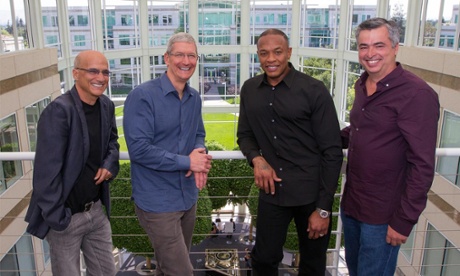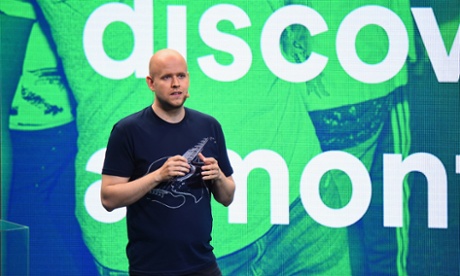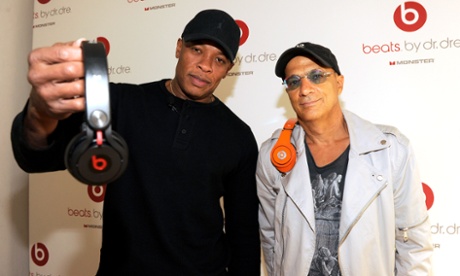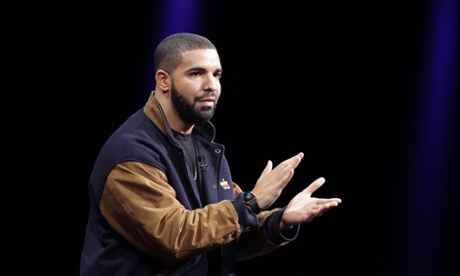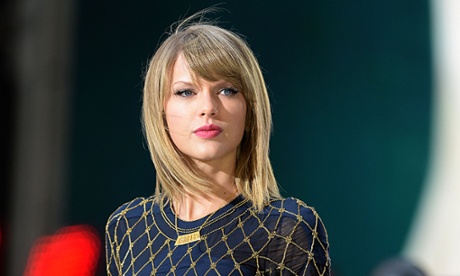Apple isn’t just gunning for Spotify with its new Apple Music streaming service. It’s gunning for radio broadcasters.
Its combination of live radio station Beats 1 and a range of non-live stations programmed by DJs aims to seduce listeners away from traditional radio, and then sell some of them a $9.99-a-month streaming subscription.
When the Guardian sits down with Apple’s Jimmy Iovine and Eddy Cue a couple of hours after they unveil the new service during the company’s WWDC keynote, that competition with radio – also Spotify’s current strategy – is the first topic of conversation.
“What I saw in the record industry is it’s just getting more restricted, more restricted, more restricted to where everyone’s trying to figure out what kind of song to make to get on the radio, that’s researched and where advertisers are telling you what to play,” says Iovine.
“What’s happened to the music industry, from my perspective, is a lot of great music is behind the wall that can’t get through, and therefore a lot of artists are getting discouraged. And we hope that this ecosystem really helps revive that.”
Not just algorithms – programming with a human touch
Iovine and Cue take pains to praise Zane Lowe, the Radio 1 DJ they poached to head up Beats 1 (“The most adventurous guy we could find: somebody who had the guts to play new music,” according to Iovine) and chief creative officer / Nine Inch Nail Trent Reznor (“An amazing musician, but he’s an amazing product guy too,” says Cue).
Part of the pitch for Apple Music is that it sees humans, not just algorithms, as its trump card for helping listeners discover new music.
“Algorithms are really great, of course, but they need a bit of a human touch in them, helping form the right sequence. Some algorithms wouldn’t know that Rock Steady could follow Start Me Up, y’know. That’s hard to do,” says Iovine.
“You have to humanise it a bit, because it’s a real art to telling you what song comes next. Algorithms can’t do it alone. They’re very handy, and you can’t do something of this scale without ‘em, but you need a strong human element.”
“Understanding that i have a lot of Latin music in my library doesn’t give me a great Cuban playlist,” adds Cue.
‘A win for everybody’
The human element may also come from Apple Connect, the bit of Apple Music that’s part-SoundCloud, part-Facebook and part-YouTube, with artists posting songs, videos, photos and status updates for the fans who follow them to see.
Rapper Drake rhapsodised about Connect on-stage at WWDC but Apple will now be pitching his peers to support it. That pitch will focus on control, it seems.
“Our viewpoint was very simple: let the artist and label control it. They can put it up on Connect for free if they want to, or they can put it up behind the [subscription] paywall, or they can make it available on the iTunes Store for sale. They’re in control of their music and how they want to distribute it,” says Cue.
Iovine jumps in. “In my opinion as a guy who ran a record company, the promotion aspect has gone way out of control. You have gigantic companies feeding off musicians and artists, because the artists need the exposure,” he says.
“There’s got to be a win for everybody: there has to be a win for the consumer, a win for the artist, a win for the rightsholders. We wanted to give artists a place where there’s a rhyme and a reason: where there’s an ecosystem where it feeds off each other. Where there’s a payoff! And not just a financial payoff, but an emotional payoff. A creative payoff.”
Apple’s pitch to artists will also involve dismissing rival streaming services – from Spotify to YouTube – as mere “utilities”, it seems. “A lot of these companies were built as utilities, and this [Apple Music] is not a utility,” says Iovine.
“As a matter of fact, some of the people we’re talking about came to my office and said ‘We’re a utility! That’s all we are: we’re a utility’. And I said well, that’s a problem,” he says, presumably referring to his days at Universal Music. “It’s a utility! It’s exactly what it sounds like: cold and noisy.”
‘We put all our energy behind the family plan’
Cue thinks that people will pay for Apple Music once they experience its features beyond that. As it turned out, despite rumours that it would undercut Spotify – $4.99 a month was being mooted in October 2014 then $7.99 in February 2015 – the service will cost $9.99 a month after a three-month trial.
Wouldn’t Apple have liked to go cheaper? “No. We always thought ‘$9.99 is the price of an album’, so on a monthly basis that’s great. Where we put all our energy behind was the family plan,” says Cue, referring to the $14.99 option that covers up to six people in a family.
He also denies a recent report that Apple is planning to aggressively promote its new streaming service to people buying albums on the iTunes Store. “That’s the wrong way to look at it. You shouldn’t take a customer who’s buying an album, who’s happy buying an album, and try to tell them that what they’re doing is wrong,” he says.
“We think that there are folks who are buying music who will continue to buy music for many, many years to come – and that’s great. And by the way they’re going get some benefits out of it, because they’re still going to get Beats 1 radio, and they’re still going to get Connect.”
Instead, he says Apple is going after a much wider audience. “There are billions of people in the world, and there are less than 20 million [streaming music] subscribers in the world. So most people don’t subscribe to music, and we think there’s a great opportunity,” he says. (Actually, an estimated 41 million people paid for a streaming music subscription in 2014, according to industry body the IFPI.)
“But we don’t have to, and we shouldn’t try to kill the iTunes Store or kill people that are buying music. If you’re happy buying a few albums a year and that’s the way you’d like to continue doing it … but if we can help you discover some new artists or some new albums through Connect or through listening to Beats 1 radio, great.”
Winning over the hearts and minds of musicians
Finally, Iovine tackles one of the biggest hot potatoes for any streaming music service in 2015: the question of whether it can win over the musicians who are worrying about making a living from streams rather than sales.
Apple is no more able to influence the music industry economics of how labels and publishers pass on payouts to performers and songwriters than Spotify is, although it can pay established artists lucrative advances to grant it exclusivity on their new releases – which is one of the rumoured strategies for Apple Music.
Can Apple Music change the mind of musicians who are anti-streaming though? Iovine responds with a speech that focuses less on specific plans than on a general ethos.
“You come out, you build this service, and a lot of it is based on free. So if you have a hit record, you’re only being paid on 20% of it, because 80% of it is free. So this generation [of] artists, the next five to seven years, they’ve got to pay for the future? What’s that? No. No! That’s wrong from my viewpoint. From a musician’s standpoint,” he says.
“So if you get 100m streams and you’re only really being paid on 20 million, that doesn’t work for the artist. Record companies will be here forever, but those artists will not be here forever. The individual who writes that song, at that moment, deserves to be compensated for it in a fair way.”
He’s on a roll by this point: “90% of them were broke last week! These aren’t trust-fund people coming in making this music, y’know! Maybe there’s eight artists in the world that can just do anything they want financially, but there’s thousands of artists who could use a couple of bucks to get by and do this stuff right,” says Iovine.
“That’s where I come at it from, you know what i mean? And we tried to build something that had enough of each thing to build an ecosystem that just feeds off each other, and gives back to an artist.”
The specific economics of that ecosystem remain to be revealed – one of a number of unanswered questions around Apple Music. Does a single global radio station risk being a jack-of-all genres, and will fans want to listen to its shows on-demand rather than on Apple’s schedule?
Will Apple secure exclusives from artists like Kanye West and Taylor Swift? What kind of analytics will artists and labels get from Apple Music? Will Connect’s ability to post to Facebook, Twitter and websites make artists use it more than they did Ping, Apple’s original attempt at a musical social network?
When Apple Music launches later in June, some of these answers will start to emerge. But the upcoming battle with Spotify to be the smartest, most artist-friendly streaming service – as well as the determination of both companies to lure listeners from radio and YouTube alike – will make for compelling viewing.
The Guardian paid for Stuart Dredge’s travel and accommodation to the WWDC show.
